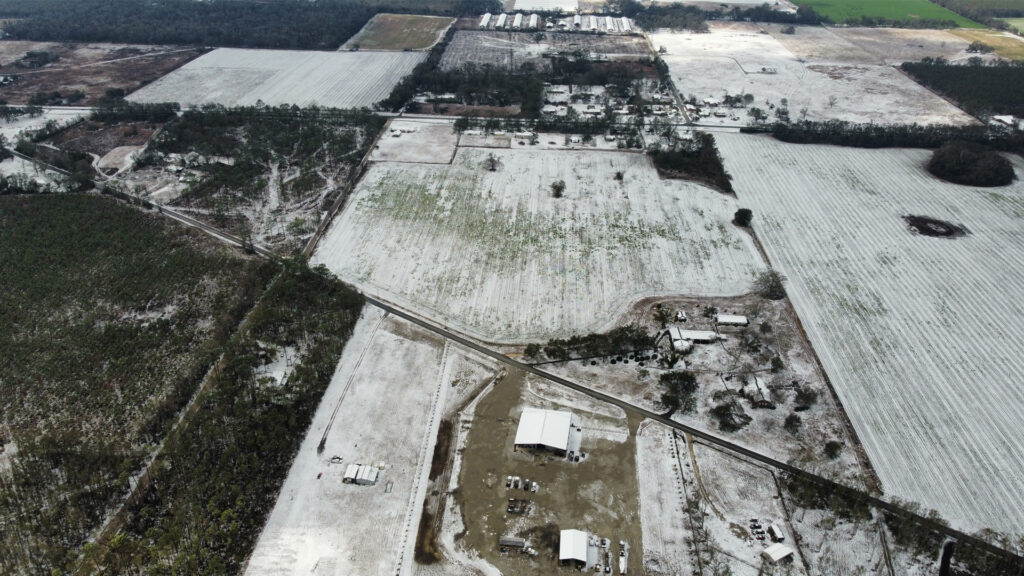By Bella Kubach, Citizens’ Climate Lobby
With a polar vortex recently setting all-time snow records in multiple states across the U.S., Floridians have been forced to adapt to a new weather pattern. After a decade without snow, Pensacola saw 1 inch last week, and many other Florida communities experienced record lows and freeze warnings.
Most of us living in the Sunshine State stayed bundled up indoors throughout the polar vortex, but our farmers were left fretting over the future of their produce and crops.
Just months ago, Hurricane Milton’s winds and extreme weather devastated many citrus crops. In a double blow, January’s frigid temperatures then threatened an already-dwindling crop. Florida’s 2024-25 orange production estimate is down by 20%, and growers faced more fear with low temperatures.

Luckily, temperatures did not dip below freezing in growing areas and it seems the citrus crop might be spared — but other crops, like sugarcane, might not be so lucky.
For years, Florida’s agricultural sector has contributed to the economy largely by bringing in millions of dollars for the state and providing thousands of jobs. However, the industry now faces threats with weather intensifying as a result of a warming atmosphere.
Climate change leads to an increase in temperatures, water stress and changes in solar radiation that impact yields, farming practices and supply security.
Although many states recently experienced extra-cold temperatures, that doesn’t dismiss the record highs we’ve seen year round, with 2024 being named the warmest year ever on record. In fact, Massachusetts Institute of Technology researchers conclude, “as Earth warms on average, climate change may lead some places to see more extreme cold spells during winter.”
The current trend in heavy snowfall and bitterly cold temperatures is directly linked to a disruption to the polar vortex caused by climate change, many scientists believe. According to Dr. Steven Decker, the director of the Meteorology Undergraduate Program at Rutgers University, the surge in cold weather is a result of a split of the polar vortex, leading smaller pieces to travel to North America.
When the vortex is strong, it keeps the cold air near the North Pole. However, when it’s weak or displaced, these frigid outbreaks occur in other areas. Decker believes that as the global temperature increases on average, there will be more blasts of cold air because of recurring displacements to the vortex.
Additionally — in news that should not be taken lightly in Florida — scientists say the intensity of hurricanes is only going to grow as climate change escalates. Conditions improve for hurricanes to become longer and stronger as the oceans and the atmosphere get warmer.
While Congress fails to hold polluters accountable for the heat-trapping carbon emissions altering our climate and exacerbating weather extremes, countless industries, like Florida’s citrus, will face detrimental impacts in coming years.
According to a recent forecast from the U.S. Department of Agriculture, Florida farmers will fill 3 million fewer boxes of oranges this growing season than they projected to pre-Hurricane Milton. This represents a decline of one-third compared to last growing season. The USDA also reports that grapefruit, tangerine and mandarin production are all experiencing stark declines.

Florida Citrus Mutual CEO Matt Joyner told Fox Business there was “no doubt” the price of orange juice would rise. Statistics show that both orange juice concentrate and oranges are already about $2 more than they were in 2020.
As prices surge, many families may be forced to skip their breakfast beverage and reevaluate the necessity for other kitchen staples with price hikes directly linked to climate extremes.
Florida’s recent snowfall may have been a pretty and unexpected surprise, but abrupt cold snaps, droughts, floods and storms all damage crops, disrupt supply chains and reduce the availability of staple foods, pushing up prices.
To solve the cost of living, an important election issue, President Donald Trump and Sens. Rick Scott and Ashley Moody cannot ignore how climate-driven disruptions contribute to food inflation. It is to their detriment to do so.
Bella Kubach is a communications intern for Citizens’ Climate Lobby, a nonprofit, grassroots climate advocacy organization, and is currently studying for a master of arts in global sustainability at the University of South Florida. She was previously a reporting intern for The Invading Sea. Banner photo: Snow on southbound Interstate 75 entering Florida during the Gulf Coast snowstorm in January 2025 (AHeneen, CC BY 4.0, via Wikimedia Commons).
Sign up for The Invading Sea newsletter by visiting here. To support The Invading Sea, click here to make a donation. If you are interested in submitting an opinion piece to The Invading Sea, email Editor Nathan Crabbe at nc*****@*au.edu.



